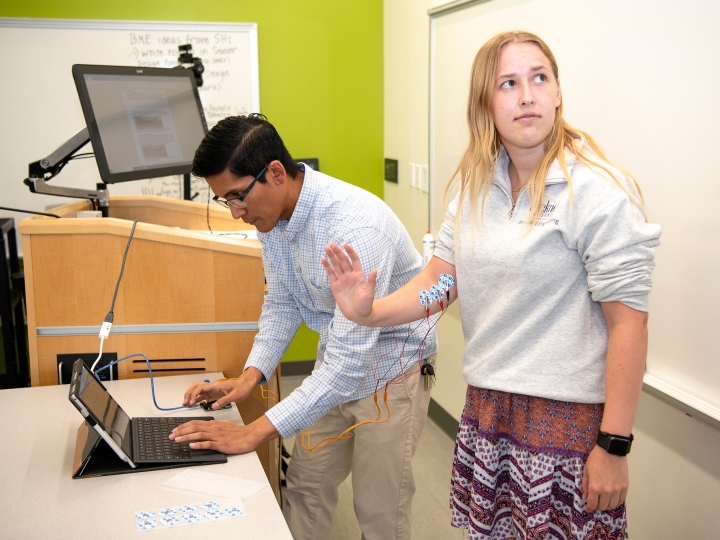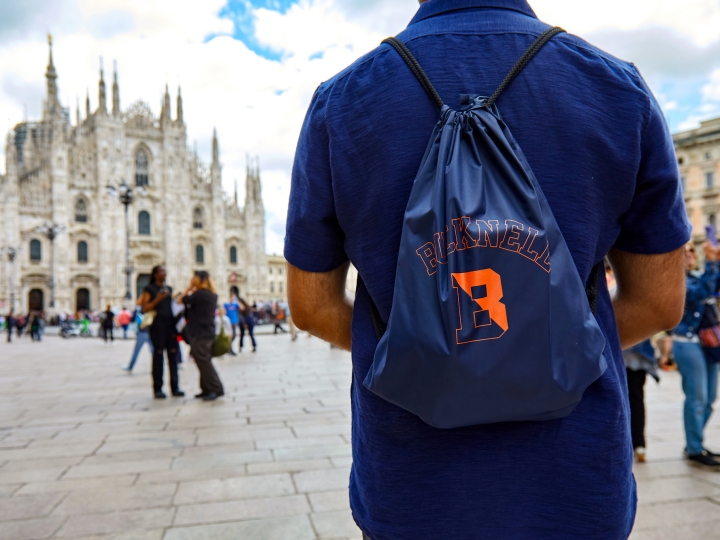Added Liberal Arts Emphasis Strengthens ILTM Program
September 12, 2016
Last summer, a group of Bucknell University students in the Institute for Leadership in Technology & Management (ILTM) was giving its final presentation to a team from a large multinational corporation that usually ranks in the top 20 in the Fortune 500. Challenged to improve customer service, the students recommended the implementation of a specific — and surprisingly affordable — piece of technology.
Midway through the presentation, the corporate team's CEO, who joined by phone, stopped the students and directly addressed his employees. "Is this really accurate? Is it really only going to cost that much? Why haven't we done this already?" The detail and extent of the students' work impressed the CEO, who later called what ILTM students have delivered to his company over multiple years "more valuable and directly actionable than six figures' worth of consulting from a prominent consulting firm."
Interactions with top executives are nothing new for ILTM students, nor is the high level of work that they produce during this annual summer program. Since the program's founding in 1991, ILTM student teams have produced work of increasing quality and depth. According to its directors, that's the result of an increased focus in recent years on academic diversity, particularly in the liberal arts.
"We're trying to push academic diversity every which way we can — with faculty, speakers, students and clients," said Professor Eric Santanen, management, who co-directs the program with Professor Joseph Tranquillo, biomedical and electrical engineering. "ILTM was an excellent program long before Joe and I became involved. The sharpened focus on the liberal arts helps move the program along the path of continuous improvement and furthers the long-standing goal of developing students into enlightened leaders."
Celebrating its 25th anniversary this year, ILTM started as a way to bring academics and industry together. Organizations — large and small, for profit and nonprofit — bring specific business challenges to the program and groups comprised of 24 rising juniors spend six weeks coming up with potential solutions, which they present to clients in the final week. A series of faculty and external speakers, many of whom are Bucknell alumni, also lead participants in interactive exercises that explore various leadership and management topics.
ILTM was only for engineering and management students until it was opened to others in the early 2000s. However, it wasn't until Santanen and Tranquillo began making a more concerted effort to attract students from the College of Arts & Sciences that the number of these students in the program increased. Additionally, Santanen and Tranquillo wanted more intellectual diversity among the speakers.
The guest speaker list used to be a who's who of management and engineering faculty. While those groups still maintain a heavy presence, recent speakers include Professor Kelly Knox, theatre & dance, Professor Joe Meiser, art & art history, former Bucknell men's basketball coach Pat Flannery '80, M'83 and Bucknell Provost Barbara Altmann.
Knox has spoken about presenting on stage, which has multiple similarities to presenting in a c-suite or boardroom. Meiser talked about portfolios and documenting work — something an artist always has in mind, but not necessarily an engineer or manager. Flannery talked about how leadership in non-corporate settings parallels corporate leadership principles. Altmann, who recently began her second year at Bucknell, spoke about the challenges of being in a leadership role while new to an organization.
"One of the tenets of intellectual diversity is to see the world through multiple lenses," said Tranquillo. "Our hope is that the addition of many liberal arts perspectives will provide the ILTM students a richer set of lenses to see the environments around them in new ways."
Just as these additional liberal arts perspectives have proven beneficial to the program, so has the program to Arts & Sciences students that have completed it. One such student is Maho Fujita '17, a native of Tokyo and an economics and international relations double major. Last year, her group worked with a midsized retailer in developing a way to integrate its various marketing tactics.
"I wanted to be able to offer a different perspective on technology and also learn about how engineers think about it in general," said Fujita. "I was also able to learn about how management is important in many aspects of life. Being exposed to group work, which in my experience isn't as common in the liberal arts as it may be in management or engineering, was also very valuable.
"I also think my perspective, not only as a liberal arts major but as an international student, was helpful to my group. I'd like to think I was the 'glue' between the management and engineering students."
Fujita added that her experience with ILTM has influenced her choice of a career path and that she is now strongly considering one in the corporate world.
Santanen believes recent enhancements to ILTM are just the beginning. "The program is fundamentally different now than it was when it started and I suspect it will be fundamentally different in the future," he said. "We've diversified the client base, the student base and the guest speaker base. The end result is that our clients, who have always been quite happy with what we give to them, are even more delighted and surprised with what they get — and there's more to come."

